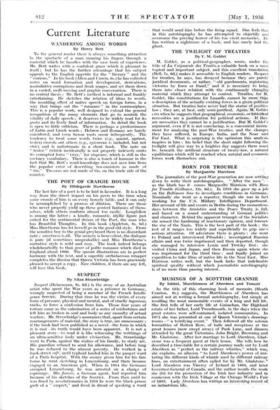Current Literature
To the general reader there is always something attractive in the spectacle of a man running his lingers through a material which he handles with the case born of experience. Mr. Bett writes with a confident grace which is pleasant in itself ; but he has the further advantage that. his subject appeals to the English appetite for the " literary " and the " curious." In his book (Allen and Unwin, Os.) he has collected notes on word formation and development, derivations, assimilative corruptions and fieak usages, and set them down in a varied, swift-moving and graphic conversation. There is no central thesis ; Mr. Bett's method is informal and frankly entertaining. He sketches the relation of ideas to words, the Moulding• effect of native speech on foreign forms, in a way that brings out the " romance " in the cominoriPlace. This' is a popular work, well designed to extend the general recognition of the many elements that go to nourish the vitality of daily speech ; it deserves to be widely read for its gusto and its lively fund of information. In detail the book is open to little criticism. There is perhaps a predominance of Latin and Greek words ; Hebrew and Roniany are barely considered, and even Saxon roots occur infrequently. The tendency to treat some words twice (e.g., quaint, apricot, tester) crowds out others (e.g., epicurean is included, but not stoic) and is unfortunate in a short book. The note on " tester " (Which incidentally is not properly indexed)-omits its corrupted form tizzy," for sixpence, which is still in the cockney vocabulary. There is also a touch of humour in the fact that Mr. Bett's word-knowiledge does not save him from the popular error of describing tea-canisters as made of
tin." Tin-cans are not made of tin, on the trade side of the counter.














































 Previous page
Previous page